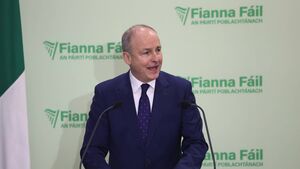Opinion: Long wait for a new government is finally over

Uachtarán Fhianna Fáil, Micheál Martin TD, presenting the draft Programme for Government to voting members for formal approval at the Fianna Fáil special Ard Fheis in Dublin. Pic: Damien Eagers
The long wait is finally over. Today, we’ll officially know that Micheál Martin is Ireland’s new Taoiseach and Simon Harris the Tánaiste. “Wow,” you might say, “no surprises there”. Ever since the polls closed on November 22nd, the outcome seemed clear. Now, weeks later, we’re on the cusp of a functioning government, and a fresh set of ministers is about to grace the corridors of power.
Of particular interest to me are the Independent ministers. I’m delighted to see Noel Grealish set to take on a role as a “super-junior minister”- a minister of state who sits at the Cabinet table. While he won’t have a vote at Cabinet meetings, that hardly matters, as such decisions rarely come down to a formal vote. Noel and I have been friends since 1999, when we were both elected to our respective councils. He’ll bring great value not just to Galway but to the whole of Connacht.
Another intriguing appointment is that of Michael Healy-Rae, who looks set to become a junior minister, likely in agriculture with responsibility for forestry. Michael’s outspokenness on rural and agricultural issues makes him a natural fit for this role. I’ve always admired his grasp of politics, people, and community. He knows that national issues begin as local ones, whether it’s health concerns in Loughglynn, crime in County Roscommon, or broader rural challenges across Connacht. Sometimes it’s only through hearing these local stories that we can fully understand and address the bigger national picture.
This new government, I hope, will bear the fingerprints of Independents. Marian Harkin, for example, is a figure I deeply admire. Decades ago, she, along with the late Seán Hannick, worked tirelessly to promote investment in the west of Ireland, chairing the Council for the West in its early days. Marian was among the first to champion the concept of “balanced regional development,” a term that remains as relevant today as when she coined it.
Like Noel Grealish and Michael Healy-Rae, Marian brings a wealth of wisdom, vision, and commitment to community development. If regional Independents can leave a mark on this government akin to what the Greens achieved in their time, it will be a win for everyone outside the Dublin bubble. A strong representation from Connacht among Fianna Fáil and Fine Gael’s Cabinet ministers would only help that cause.
Naturally, speculation is rife about who will land which positions. In Connacht, Dara Calleary and Alan Dillon of Mayo and Hildegarde Naughton of Galway are tipped for senior Cabinet roles, though Naughten and Calleary appear the stronger contenders. As for junior ministerial appointments, it would be surprising if Frank Feighan or Martin Daly do not get a role, though those decisions may take a little longer.
Unfortunately, history has taught us in Roscommon to temper our expectations. In the past 45 years, we’ve only had two ministers—Seán Doherty and Denis Naughten and neither for very long. Even Albert Reynolds, who served as Taoiseach while representing Longford-Roscommon, felt more like a TD for Longford. Compare this with our neighbours in Mayo and Galway, and the disparity becomes glaring. For us, even a junior ministerial appointment carries weight.
Amid the discussions of appointments, the issue of expenses has also come to the fore. Reports suggest that the new ministers of state have negotiated an increase in travel allowances, arguing that the current salary and expense package—already substantial—doesn’t fully cover their costs.
Currently, junior ministers earn €113,679 per year as a TD, with an additional €45,846 for their ministerial role. Super-junior ministers, who sit at the Cabinet table, receive an extra €16,000 on top of that. Now, they’re set to gain a travel allowance worth up to €32,535 per year. The full cabinet minister gets €92,938 on top of the basic TDs salary of €113,679. Yes there’s expenses on top of that too.
All this talk of ministerial allowances and expenses highlights a stark contrast. While ministers negotiate travel perks, local GAA referees face scrutiny from Revenue for their €40-per-match expense payments. These small sums are meant to cover petrol and other costs, but anyone who’s recently filled their car will know how quickly that money disappears. You’d need to officiate at several matches just to break even on a full tank of fuel.
As this new government takes shape, the hope is that it will address not just high-profile national policies but also the everyday realities facing ordinary people. Whether it’s supporting rural communities, ensuring a fair deal for places like Roscommon, or addressing the small but significant financial pressures faced by local volunteers, the new leadership has a chance to make a meaningful difference.
Time will tell whether they rise to the occasion or whether the chorus of disillusionment continues to grow louder.





